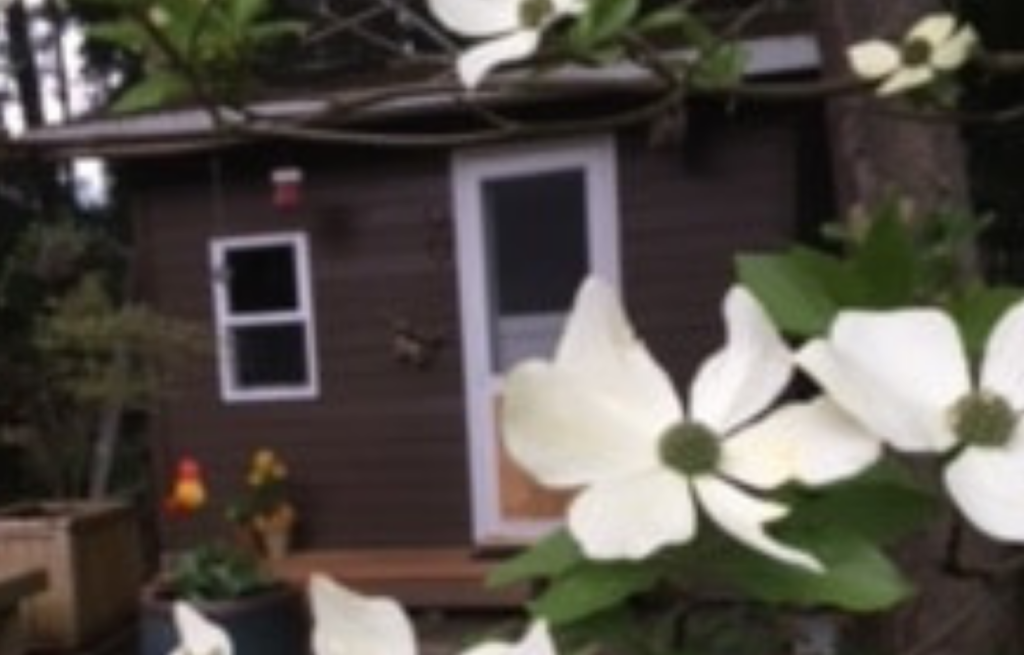Don’t say what you don’t want…
 I have been mucking out my writing cabin. It is a lot like mucking out a stable, or should be, could be. Except I find that I have difficulty letting anything go. So all the pieces of paper get taken out of boxes and then put back in. I managed to part with a little under two boxes of books, when I really need to let go of 8 or 10 boxes of books. Honestly. (And I will still have plenty of books. No worries of staring, bookless shelves here.)
I have been mucking out my writing cabin. It is a lot like mucking out a stable, or should be, could be. Except I find that I have difficulty letting anything go. So all the pieces of paper get taken out of boxes and then put back in. I managed to part with a little under two boxes of books, when I really need to let go of 8 or 10 boxes of books. Honestly. (And I will still have plenty of books. No worries of staring, bookless shelves here.)
Yesterday, after several hours of this sort of dithering, I had made a little progress. I put my Scarlet Letter books down on a bottom shelf and put my WWI books up on the go-to shelf, in preparation for my new project. I boxed up drafts of my novel (which is now on its honest-to-goodness final read through…I hope), and when the box wouldn’t hold them all, I put two copies (the least marked up) into the recycling bin. I took pages out of notebooks and set the notebooks aside to be used for new projects.
But there were still all those books, and not enough space on the shelves. I don’t want to have books on the floor and the desk and the chair.
If you had sneaked up to my window and listened you would have heard me saying–
- I can’t stand to give up my books!
- I LOVE my books!
- I have a VERY HARD TIME giving up any books!
- I NEED my books!
- My books make me feel SAFE!
After saying these things enough times (or just thinking them, very loudly), I finally heard myself saying them. And I remembered the advice I give my students: Don’t say what you don’t want.
I can’t write. I hate to write. I’m no good at writing. My job, when I hear statements like this is to help students revise what they are saying about their own unlimited abilities and inner resources — into something kinder. I am willing to try this. I can get better at writing. I’m really good at learning and I can learn to write. I’m not afraid to give this a shot and see what happens.
One of my favorite illustrations of this principle came from the woman who cuts my hair. One day, as I sat, ready to be shorn, she held up a brush, a ruined brush, and said, “Would you look at that! Last night while I was getting ready to leave, I kept telling myself, ‘You are going to forget your brush in the cleaning solution! You shouldn’t set it in there this late, because you’ll forget it and it will be ruined!’ And sure enough,” she finished, “that’s exactly what I did!”
Of course it was. Don’t say what you don’t want. Say what you want.
- There are more books where these came from
- The library can help me find any books that I decide, some day, to reread
- I am safe even without so many books
- A peaceful, uncluttered space is so great for my writing
- Books that are stuck in boxes might as well go to someone new who will treasure them
- My shelves are not going to be empty; I can let go of some of these books and STILL HAVE A LOT OF BOOKS
Okay, so I’m working on it.


Great advice! I have this problem with books as well and with sentimental stuff, especially old family photos inhabiting boxes that have currently migrated into my small office, making it even smaller (and more cluttered). Like you, I need to tell myself I’m safe even without them…
I have this new idea, too, about “releasing books into the wild.” I’ve surely kept so many of them long enough, and there must be other adventures out there. Don’t get me started on family photos!
Yes to decluttering! It also opens up creativity in surprising ways! Two terrific books on the topic:
1) The Life-Changing Magic of Tidying Up: The Japanese Art of Decluttering and Organizing by Marie Kondo;
and
2) Essentialism: The Disciplined Pursuit of Less by Greg McKeown
I just realized the irony of giving you two new book titles 🙂
I’ve read Life-Changing Magic. Will look for Essentialism. The library, perhaps? 😉
OK, here goes: I want a writing cabin! That looks like such a nice little spot to be…
I HIGHLY recommend the writing cabin!